Suchergebnisse für "atlas OR dca75 OR pro OR advanced OR semiconductor OR analyser"
-

Nordic Semiconductor Nordic Semiconductor nRF52840 USB-Dongle
Der nRF52840-Dongle ist ein kleiner, kostengünstiger USB-Dongle, der die proprietären Protokolle Bluetooth 5.3, Bluetooth Mesh, Thread, ZigBee, 802.15.4, ANT und 2,4 GHz unterstützt. Der Dongle ist die perfekte Hardware für die Verwendung mit nRF Connect for Desktop, da er kostengünstig ist und dennoch alle drahtlosen Nahbereichsstandards unterstützt, die mit Nordic-Geräten verwendet werden. Der Dongle wurde entwickelt, um zusammen mit nRF Connect for Desktop als drahtloses HW-Gerät verwendet zu werden. Für andere Anwendungsfälle beachten Sie bitte, dass es keine Debug-Unterstützung auf dem Dongle gibt, sondern nur Unterstützung für die Programmierung des Geräts und die Kommunikation über USB. Es wird von den meisten nRF Connect for Desktop-Apps unterstützt und bei Bedarf automatisch programmiert. Darüber hinaus können benutzerdefinierte Anwendungen kompiliert und auf den Dongle heruntergeladen werden. Es verfügt über eine benutzerprogrammierbare RGB-LED, eine grüne LED, eine benutzerprogrammierbare Taste sowie 15 GPIO, die über kronenförmige Lötpunkte entlang der Kante zugänglich sind. Beispielanwendungen sind im nRF5 SDK unter dem Boardnamen PCA10059 verfügbar. Der nRF52840-Dongle wird von nRF Connect for Desktop sowie von der Programmierung über nRFUtil unterstützt. Features Bluetooth 5.2-fähiges Multiprotokoll-Funkgerät 2 Mbit/s Lange Reichweite Werbeerweiterungen Kanalauswahlalgorithmus 2 (CSA #2) IEEE 802.15.4-Funkunterstützung Thread ZigBee Arm Cortex-M4 mit Gleitkommaunterstützung DSP-Befehlssatz ARM CryptoCell CC310-Kryptografiebeschleuniger 15 GPIO über Edge-Castellation verfügbar USB-Schnittstelle direkt zum nRF52840 SoC Integrierte 2,4-GHz-PCB-Antenne 1 Programmierbare Taste 1 Programmierbare RGB-LED 1 Programmierbare LED 1,7-5,5 V Betrieb über USB oder extern Downloads Datasheet Hardware Files
€ 19,95
Mitglieder € 17,96
-
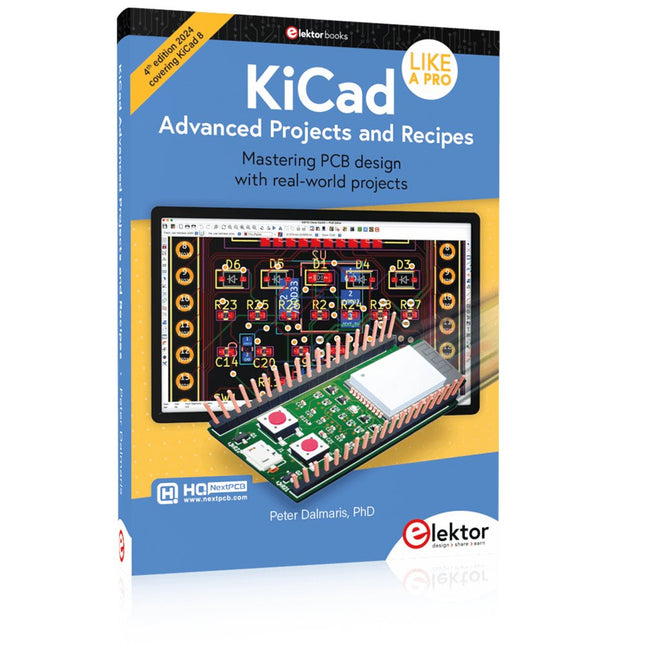
Elektor Publishing KiCad Like A Pro – Advanced Projects and Recipes
Mastering PCB design with real-world projects This book builts on KiCad Like a Pro – Fundamentals and Projects and aims to help you practice your new KiCad skills by challenging you in a series of real-world projects. The projects are supported by a comprehensive set of recipes with detailed instructions on how to achieve a variety of simple and complex tasks. Design the PCBs for a solar power supply, an LED matrix array, an Arduino-powered datalogger, and a custom ESP32 board. Understand the finer details of the interactive router, how to manage KiCad project teams with Git, how to use an autorouter on 2 and 4-layer PCBs, and much more. KiCad 8 is a modern, cross-platform application suite built around schematic and design editors. This stable and mature PCB tool is a perfect fit for electronic engineers and makers. With KiCad 8, you can create PCBs of any complexity and size without the constraints associated with the commercial packages. Here are the most significant improvements and features in KiCad 8, both over and under the hood: Modern user interface, completely redesigned from earlier versions Improved and customizable electrical and design rule checkers Theme editor allowing you to fully customize the look of KiCad on your screen Ability to import projects from Eagle, CADSTART, and more An improved and tightly integrated SPICE circuit simulator Autorouting with the Freerouting plugin Filters define which elements of a layout are selectable Enhanced interactive router helps you draw single tracks and differential pairs with precision New or enhanced tools to draw tracks, measure distances, tune track lengths, etc. Enhanced tool for creating filled zones A customizable coordinate system facilitates data exchange with other CAD applications Realistic ray-tracing capable 3D viewer Differential pair routing Rich repositories of symbol, footprint, and 3D shape libraries Python scripting API for programmatic customization and extensions Improved footprint wizard for fast custom footprints
€ 49,95
Mitglieder € 44,96
-

Elektor Digital KiCad Like A Pro – Advanced Projects and Recipes (E-book)
Mastering PCB design with real-world projects This book builts on KiCad Like a Pro – Fundamentals and Projects and aims to help you practice your new KiCad skills by challenging you in a series of real-world projects. The projects are supported by a comprehensive set of recipes with detailed instructions on how to achieve a variety of simple and complex tasks. Design the PCBs for a solar power supply, an LED matrix array, an Arduino-powered datalogger, and a custom ESP32 board. Understand the finer details of the interactive router, how to manage KiCad project teams with Git, how to use an autorouter on 2 and 4-layer PCBs, and much more. KiCad 8 is a modern, cross-platform application suite built around schematic and design editors. This stable and mature PCB tool is a perfect fit for electronic engineers and makers. With KiCad 8, you can create PCBs of any complexity and size without the constraints associated with the commercial packages. Here are the most significant improvements and features in KiCad 8, both over and under the hood: Modern user interface, completely redesigned from earlier versions Improved and customizable electrical and design rule checkers Theme editor allowing you to fully customize the look of KiCad on your screen Ability to import projects from Eagle, CADSTART, and more An improved and tightly integrated SPICE circuit simulator Autorouting with the Freerouting plugin Filters define which elements of a layout are selectable Enhanced interactive router helps you draw single tracks and differential pairs with precision New or enhanced tools to draw tracks, measure distances, tune track lengths, etc. Enhanced tool for creating filled zones A customizable coordinate system facilitates data exchange with other CAD applications Realistic ray-tracing capable 3D viewer Differential pair routing Rich repositories of symbol, footprint, and 3D shape libraries Python scripting API for programmatic customization and extensions Improved footprint wizard for fast custom footprints
€ 39,95
Mitglieder € 31,96
-

Voltera Voltera Advanced Bundle
Inhalt des Kits 1x Conductor 2 Tintenpatrone 1x Düsen - 225 Mikron (4er-Pack) 1x Polierpads (3er Pack) 2x 2'x3' Substrate (10er-Pack) 2x 3'x4' Substrate (6er-Pack)
€ 199,95€ 179,95
Mitglieder identisch
-
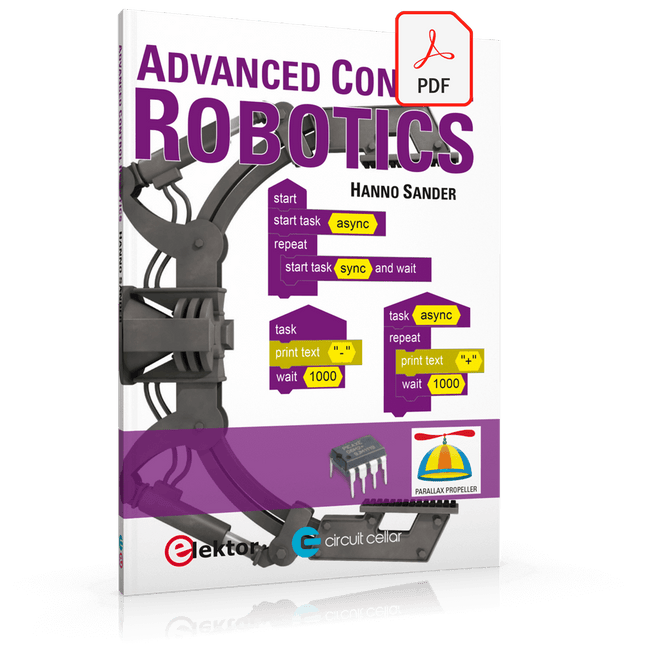
Elektor Digital Advanced Control Robotics (E-book)
If you enjoy DIY electronics, projects, software and robots, you’ll find this book intellectually stimulating and immediately useful. With the right parts and a little guidance, you can build robot systems that suit your needs more than overpriced commercial systems can. 20 years ago, robots based on simple 8-bit processors and touch sensors were the norm. Now, it’s possible to build multi-core robots that can react to their surroundings with intelligence. Today’s robots combine sensor readings from accelerometers, gyroscopes and computer vision sensors to learn about their environments. They can respond using sophisticated control algorithms and they can process data both locally and in the cloud. This book, which covers the theory and best practices associated with advanced robot technologies, was written to help roboticists, whether amateur hobbyist or professional, take their designs to the next level. As will be seen, building advanced applications does not require extremely costly robot technology. All that is needed is simply the knowledge of which technologies are out there and how best to use each of them. Each chapter in this book will introduce one of these different technologies and discuss how best to use it in a robotics application. On the hardware side, we’ll cover microcontrollers, servos, and sensors, hopefully inspiring you to design your own awe-inspiring, next-generation systems. On the software side, we’ll cover programming languages, debugging, algorithms, and state machines. We’ll focus on the Arduino, the Parallax Propeller, Revolution Education PICAXE and projects I’ve with which I’ve been involved, including the TBot educational robot, the PropScope oscilloscope, the 12Blocks visual programming language, and the ViewPort development environment. In addition, we’ll serve up a comprehensive introduction to a variety of essential topics, including output (e.g. LEDs, servo motors), and communication technologies (e.g. infrared, audio), that you can use to develop systems that interact to stimuli and communicate with humans and other robots. To make these topics as accessible as possible, handy schematics, sample code and practical tips regarding building and debugging have been included. Hanno Sander Christchurch, New Zealand
€ 24,95
Mitglieder € 19,96
-
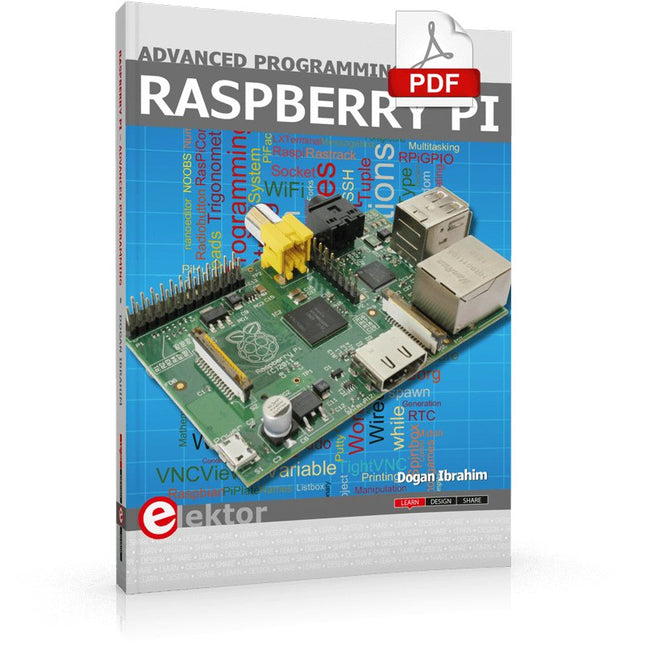
Elektor Digital Raspberry Pi Advanced Programming (E-book)
This book is about advanced programming of the Raspberry Pi computer using the Python programming language. The book explains in simple terms and with examples: How to configure the Raspberry Pi computer; How to install and use the Linux operating system and the desktop; How to write advanced programs using the Python programming language; How to use graphics in our programs; How to develop hardware based projects using the Raspberry Pi. The book starts with an introduction to the Raspberry Pi computer and covers the topics of purchasing all the necessary accessories and installing and operating the Linux operating system in command mode. The network interface of the RPi is explained in simple steps, demonstrating how the computer can be accessed remotely from a desktop or a laptop computer. The remaining parts of the book cover the Python programming language in detail, including advanced topics such as operating system calls, multitasking, interprocess synchronization and interprocess communication techniques. The important topic of network programming using UDP and TCP protocols is described with working examples. The Tkinter graphical user interface module (GUI) is described in detail with example widgets and programs. The last part of the book includes hardware projects based on using the advanced programming topics such as multitasking and interprocess communication techniques. All the projects given in the book have been fully tested and are working. Complete program listings of all projects are provided with detailed explanations.
€ 34,95
Mitglieder € 27,96
-

Elektor Digital Advanced Programming with STM32 Microcontrollers (E-book)
Master the software tools behind the STM32 microcontroller This book is project-based and aims to teach the software tools behind STM32 microcontroller programming. Author Majid Pakdel has developed projects using various different software development environments including Keil MDK, IAR Embedded Workbench, Arduino IDE and MATLAB. Readers should be able to use the projects as they are, or modify them to suit to their own needs. This book is written for students, established engineers, and hobbyists. STM32 microcontroller development boards including the STM32F103 and STM32F407 are used throughout the book. Readers should also find it easy to use other ARM-based development boards. Advanced Programming with STM32 Microcontrollers includes: Introduction to easy-to-use software tools for STM32 Accessing the features of the STM32 Practical, goal oriented learning Complete code available online Producing practical projects with ease Topics cover: Pulse Width Modulation Serial Communication Watchdog Timers I²C Direct Memory Access (DMA) Finite State Machine Programming ADCs and DACs External Interupts Timers and Counters
€ 29,95
Mitglieder € 23,96
-

Elektor Digital Raspberry Pi 3 – Basic to Advanced Projects (E-book)
This book is about the Raspberry Pi 3 computer and its use in various control and monitoring applications. The book explains in simple terms and with tested and working example projects, how to configure the Raspberry Pi 3 computer, how to install and use the Linux operating system, and how to write hardware based applications programs using the Python programming language. The nice feature of this book is that it covers many Raspberry Pi 3 based hardware projects using the latest hardware modules such as the Sense HAT, Swiss Pi, MotoPi, Camera module, and many other state of the art analog and digital sensors. An important feature of the Raspberry Pi 3 is that it contains on-board Bluetooth and Wi-Fi modules. Example projects are given in the book on using the Wi-Fi and the Bluetooth modules to show how real-data can be sent to the Cloud using the Wi-Fi module, and also how to communicate with an Android based mobile phone using the Bluetooth module. The book is ideal for self-study, and is intended for electronic/electrical engineering students, practising engineers, research students, and for hobbyists. It is recommended that the book should be followed in the given Chapter order. Over 30 projects are given in the book. All the projects in the book are based on the Python programming language and they have been fully tested. Full program listings of every project are given in the book with comments and full descriptions. Experienced programmers should find it easy to modify and update the programs to suit their needs. The following sub-headings are given for each project to make it as easy as possible for the readers to follow the projects: Project title Description Aim of the project Raspberry Pi type Block diagram Circuit diagram Program listing
€ 29,95
Mitglieder € 23,96
-
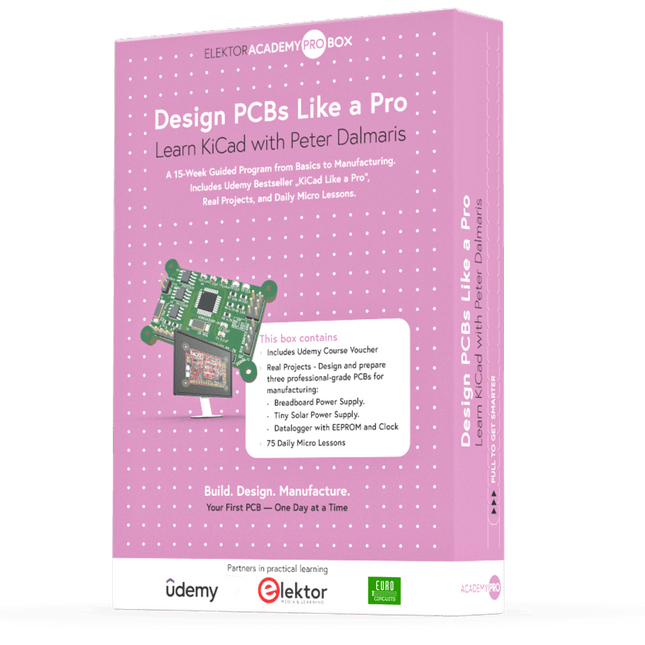
Elektor Academy Pro Design PCBs Like a Pro
KiCad lernen mit Peter Dalmaris Die Academy Pro Box "Design PCBs like a Pro" bietet ein umfassendes, strukturiertes Schulungsprogramm im PCB-Design, das Online-Lernen mit praktischer Anwendung kombiniert. Das 15-wöchige Programm basiert auf Peter Dalmaris’ KiCad-Kurs und integriert Videolektionen, gedruckte Materialien (2 Bücher) und praktische Projekte. So stellen die Teilnehmer sicher, dass sie nicht nur die Theorie verstehen, sondern auch die Fähigkeiten entwickeln, diese in der Praxis anzuwenden. Im Gegensatz zu Standardkursen bietet die Academy Pro Box einen geführten Lernpfad mit wöchentlichen Meilensteinen und physischen Komponenten zum Entwerfen, Testen und Produzieren funktionsfähiger PCBs. Dieser Ansatz fördert ein intensiveres Lernerlebnis und eine bessere Wissensspeicherung. Die Box ist ideal für Ingenieure, Studierende und Fachleute, die praktische PCB-Design-Kenntnisse mit Open-Source-Tools erwerben möchten. Mit der zusätzlichen Option, ihr Abschlussprojekt fertigstellen zu lassen, schließen die Teilnehmer das Programm mit echten Ergebnissen ab – bereit zum Einsatz, Testen oder zur Weiterentwicklung. Learn by doing Fähigkeiten aufbauen. Echte Leiterplatten entwerfen. Gerber-Dateien erstellen. Ihre erste Bestellung aufgeben. Dies ist nicht nur ein Kurs – es ist ein komplettes Projekt von der Idee bis zum Produkt. Was Sie lernen/erhalten Grundkenntnisse der KiCad-Tools Sicherheit beim Entwurf eigener Leiterplatten Eine vollständig herstellbare Leiterplatte – von Ihnen selbst erstellt Was ist in der Box (Kurs)? Beide Bände von „KiCad Like a Pro“ (im Wert von 105 €) Vol 1: Fundamentals and Projects Vol 2: Advanced Projects and Recipes Gutscheincode für den erfolgreichen KiCad 9-Onlinekurs von Peter Dalmaris auf Udemy mit über 20 Stunden Videotraining. Sie erstellen drei komplette Designprojekte: Breadboard-Stromversorgung Winzige Solarstromversorgung Datenlogger mit EEPROM und Uhr Gutschein von Eurocircuits für die Herstellung von Leiterplatten (im Wert von 85 € exkl. MwSt.) Lernmaterial (dieser Box) 15-wöchiges Lernprogramm ▶ Klicken Sie hier zum Öffnen Week 1: Setup, Fundamentals, and First Steps in PCB Design Week 2: Starting Your First PCB Project – Schematic Capture Week 3: PCB Layout – From Netlist to Board Design Week 4: Design Principles, Libraries, and Workflow Week 5: Your First Real-World PCB Project Week 6: Custom Libraries – Symbols, Footprints, and Workflow Week 7: Advanced Tools – Net Classes, Rules, Zones, Routing Week 8: Manufacturing Files, BOMs, and PCB Ordering Week 9: Advanced Finishing Techniques – Graphics, Refinement, and Production Quality Week 10: Tiny Solar Power Supply – From Schematic to Layout Week 11: Tiny Solar Power Supply – PCB Layout and Production Prep Week 12: ESP32 Clone Project – Schematic Design and Layout Prep Week 13: ESP32 Clone – PCB Layout and Manufacturing Prep Week 14: Final Improvements and Advanced Features Week 15: Productivity Tools, Simulation, and Automation KiCad-Kurs mit 18 Lektionen auf Udemy (von Peter Dalmaris) ▶ Klicken Sie hier zum Öffnen Introduction Getting started with PCB design Getting started with KiCad Project: A hands-on tour of KiCad (Schematic Design) Project: A hands-on tour of KiCad (Layout) Design principles and PCB terms Design workflow and considerations Fundamental KiCad how-to: Symbols and Eeschema Fundamental KiCad how-to: Footprints and Pcbnew Project: Design a simple breadboard power supply PCB Project: Tiny Solar Power Supply Project: MCU datalogger with build-in 512K EEPROM and clock Recipes KiCad 9 new features and improvements Legacy (from previous versions of KiCad) KiCad 7 update (Legacy) (Legacy) Gettings started with KiCad Bonus lecture Über den Autor Dr. Peter Dalmaris, PhD, ist Pädagoge, Elektroingenieur und Maker. Er erstellt Online-Videokurse zum Thema DIY-Elektronik und ist Autor mehrerer Fachbücher. Seit 2013 ist er Chief Tech Explorer bei Tech Explorations, dem von ihm in Sydney (Australien) gegründeten Unternehmen. Seine Mission ist es, Technologie zu erforschen und die Welt zu bilden. Was ist Elektor Academy Pro? Elektor Academy Pro bietet maßgeschneiderte Lernlösungen für Fachkräfte, Ingenieurteams und technische Experten in der Elektronik- und Embedded-Systems-Branche. Sie unterstützt Einzelpersonen und Organisationen dabei, ihr praktisches Know-how zu vertiefen, ihre Skills gezielt auszubauen und dank hochwertiger Inhalte und praxisnaher Tools stets einen Schritt voraus zu sein. Von realen Projekten und spezialisierten Kursen bis hin zu fundierten technischen Insights – Elektor versetzt Ingenieure in die Lage, aktuelle Herausforderungen der Branche erfolgreich zu meistern. Unser Bildungsportfolio umfasst Academy-Bücher, Pro-Boxen, Webinare, Konferenzen und B2B-Fachmagazine – alles mit Blick auf praxisnahe Weiterbildung und berufliches Wachstum. Ob Ingenieur, F&E-Spezialist oder technischer Entscheider: Elektor Academy Pro schlägt die Brücke zwischen Theorie und Praxis – und hilft Ihnen, neue Technologien zu beherrschen und Innovationen in Ihrem Unternehmen gezielt voranzutreiben.
€ 199,95€ 164,95
Mitglieder identisch
-

SparkFun SparkFun Pro Micro (RP2350)
Der SparkFun RP2350 Pro Micro bietet eine leistungsstarke Entwicklungsplattform, die auf dem RP2350-Mikrocontroller basiert. Dieses Board verwendet den aktualisierten Pro Micro-Formfaktor. Es umfasst einen USB-C-Anschluss, einen Qwiic-Anschluss, eine adressierbare WS2812B-RGB-LED, Boot- und Reset-Tasten, eine rücksetzbare PTC-Sicherung sowie PTH- und zinnenförmige Lötpads. Der RP2350 ist ein einzigartiger Dual-Core-Mikrocontroller mit zwei ARM Cortex-M33-Prozessoren und zwei Hazard3 RISC-V-Prozessoren, die alle mit bis zu 150 MHz laufen! Das bedeutet jedoch nicht, dass der RP2350 ein Quad-Core-Mikrocontroller ist. Stattdessen können Benutzer auswählen, welche zwei Prozessoren stattdessen beim Booten ausgeführt werden sollen. Sie können zwei Prozessoren desselben Typs oder jeweils einen davon betreiben. Der RP2350 verfügt außerdem über 520 kB SRAM in zehn Bänken, eine Vielzahl von Peripheriegeräten, darunter zwei UARTs, zwei SPI- und zwei I²C-Controller sowie einen USB 1.1-Controller für Host- und Geräteunterstützung. Der Pro Micro verfügt außerdem über zwei erweiterte Speicheroptionen: 16 MB externer Flash und 8 MB PSRAM, verbunden mit dem QSPI-Controller des RP2350. Der RP2350 Pro Micro arbeitet mit C/C++ unter Verwendung der Entwicklungsumgebungen Pico SDK, MicroPython und Arduino. Features RP2350-Mikrocontroller 8 MB PSRAM 16 MB Flash Versorgungsspannung USB: 5 V RAW: 5,3 V (max.) Pro Micro Pinbelegung 2x UART 1x SPI 10x GPIO (4 werden für UART1 und UART0 verwendet) 4x Analog USB-C-Anschluss USB 1.1-Host-/Geräteunterstützung Qwiic-Connector Buttons Reset Boot LEDs WS2812 Adressierbare RGB-LED Rote Power-LED Abmessungen: 33 x 17,8 mm Downloads Schematic Eagle Files Board Dimensions Hookup Guide RP2350 MicroPython Firmware (Beta 04) SparkFun Pico SDK Library Arduino Pico Arduino Core Datasheet (RP2350) Datasheet (APS6404L PSRAM) RP2350 Product Brief Raspberry Pi RP2350 Microcontroller Documentation Qwiic Info Page GitHub Repository
€ 24,95€ 17,95
Mitglieder identisch
-

Arduino Arduino Pro Portenta C33
Das Portenta C33 ist ein leistungsstarkes System-on-Module, das für kostengünstige Internet-of-Things (IoT)-Anwendungen entwickelt wurde. Basierend auf dem R7FA6M5BH2CBG Mikrocontroller von Renesas hat dieses Board den gleichen Formfaktor wie das Portenta H7 und ist mit diesem rückwärtskompatibel, wodurch es durch seine High-Density-Anschlüsse vollständig mit allen Schilden und Trägern der Portenta-Familie kompatibel ist. Als kostengünstiges Gerät ist das Portenta C33 eine ausgezeichnete Wahl für Entwickler, die IoT-Geräte und -Anwendungen mit geringem Budget erstellen möchten. Ganz gleich, ob Sie ein Smart-Home-Gerät oder einen vernetzten Industriesensor entwickeln, der Portenta C33 bietet die Verarbeitungsleistung und die Konnektivitätsoptionen, die Sie benötigen, um Ihre Arbeit zu erledigen. Mit Portenta C33 lassen sich KI-gestützte Projekte schnell und einfach umsetzen, da eine Vielzahl an gebrauchsfertigen Software-Bibliotheken und Arduino-Sketches sowie Widgets zur Anzeige von Daten in Echtzeit auf Arduino IoT Cloud-basierten Dashboards zur Verfügung stehen. Features Ideal für kostengünstige IoT-Anwendungen mit Wi-Fi/Bluetooth LE-Konnektivität Unterstützt MicroPython und andere höhere Programmiersprachen Bietet Sicherheit auf Hardwareebene auf Industrieniveau und sichere OTA-Firmware-Updates Nutzt gebrauchsfertige Softwarebibliotheken und Arduino-Skizzen Perfekt zum Überwachen und Anzeigen von Echtzeitdaten auf Arduino IoT Cloud-Widget-basierten Dashboards Kompatibel mit den Arduino-Portenta- und MKR-Familien Mit Kronenstiften für automatische Montagelinien Kostengünstige Leistung Portenta C33 ist zuverlässig, sicher und verfügt über eine seiner Reichweite würdige Rechenleistung. Er wurde entwickelt, um großen und kleinen Unternehmen in allen Bereichen die Möglichkeit zu bieten, auf das IoT zuzugreifen und von höheren Effizienzniveaus und Automatisierung zu profitieren. Applikationen Portenta C33 bietet Nutzern mehr Anwendungen als je zuvor, von der schnellen Plug-and-Play-Prototyperstellung bis hin zur Bereitstellung einer kostengünstigen Lösung für Projekte im industriellen Maßstab. Industrielles IoT-Gateway Maschinenüberwachung zur Verfolgung von OEE/OPE Inline-Qualitätskontrolle und -sicherung Überwachung des Energieverbrauchs Gerätesteuerungssystem Gebrauchsfertige IoT-Prototyping-Lösung Technische Daten Mikrocontroller Renesas R7FA6M5BH2CBG ARM Cortex-M33: ARM Cortex-M33 Core mit bis zu 200 MHz 512 kB Onboard-SRAM 2 MB Onboard-Flash Arm TrustZone Secure Crypto Engine 9 Externe Speicher 16 MB QSPI Flash USB-C USB-C High-Speed Konnektivität 100 MB Ethernet-Schnittstelle (PHY) Wi-Fi Bluetooth Low Energy Schnittstellen CAN SD-Karte ADC GPIO SPI I²S I²C JTAG/SWD Sicherheit NXP SE050C2 Sicheres Element Betriebstemperatur -40 bis +85 °C Abmessungen 66,04 x 25,40 mm Downloads Datasheet Schematics
€ 79,95€ 59,95
Mitglieder identisch
-
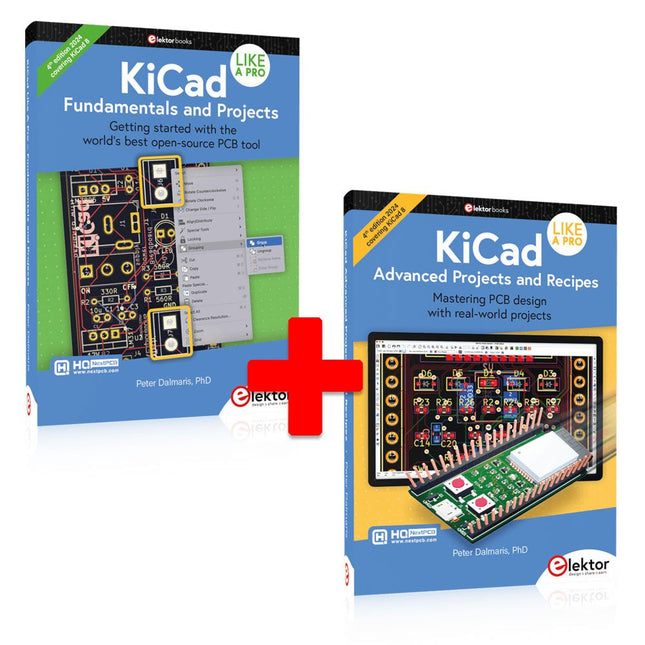
Elektor Bundles KiCad Like A Pro (Bundle)
Dieses Bundle enthält beide Bände von "KiCad Like a Pro" (4. Ausgabe 2024). In Fundamentals and Projects (Einzelpreis: 49,95 €) lernen Sie den praktischen Umgang mit KiCad kennen, sodass Sie schnell produktiv werden und mit dem Entwurf Ihrer eigenen Boards beginnen können. Mit Advanced Projects and Recipes (Einzelpreis: 44,95 €) können Sie Ihre neuen KiCad-Kenntnisse üben, indem Sie sich selbst mit einer Reihe realer Projekte herausfordern. Die neueste Version von KiCad, dem weltweit besten kostenlosen PCB-Tool, ist vollgepackt mit Funktionen, die normalerweise nur in teuren kommerziellen CAD-Tools zu finden sind. Diese moderne, plattformübergreifende Anwendungssuite, die auf Schaltplan- und Designeditoren mit Zusatzanwendungen basiert, ist ein stabiles und ausgereiftes PCB-Tool. KiCad 8 ist perfekt für Elektronikingenieure und -hersteller geeignet. Hier sind die wichtigsten Verbesserungen und Funktionen in KiCad 8, sowohl über als auch unter der Haube: Moderne Benutzeroberfläche, im Vergleich zu früheren Versionen komplett neu gestaltet Verbesserte und anpassbare Prüffunktionen für elektrische und Designregeln Designeditor, mit dem Sie KiCad auf Ihrem Bildschirm anpassen können Möglichkeit zum Importieren von Projekten aus Eagle, CADSTART und mehr Python-Skripting-API Verbesserter integrierter SPICE-Schaltkreissimulator Mehrblatt-Schaltpläne Filter definieren auswählbare Elemente Verbesserter interaktiver Router hilft Ihnen, einzelne Spuren und Differenzialpaare präzise zu zeichnen Neue oder verbesserte Tools zum Zeichnen von Spuren, Messen von Entfernungen, Anpassen von Spurlängen usw. Erweiterte interaktive Router Integrierter Stücklistengenerator Realistischer Raytracing-fähiger 3D-Viewer Anpassbare Teardrops Plug-in-Manager für die schnelle Installation von Designs, Bibliotheken und Funktionen wie Autoroutern und Stücklistengeneratoren Das erste Buch KiCad Like A Pro – Fundamentals and Projects bringt Ihnen den Umgang mit KiCad durch einen praktischen Ansatz bei. Es wird Ihnen helfen, schnell produktiv zu werden und mit dem Entwurf Ihrer eigenen Platinen zu beginnen. Beispielprojekte veranschaulichen die grundlegenden Funktionen von KiCad, auch wenn Sie keine Vorkenntnisse im PCB-Design haben. Der Autor beschreibt den gesamten Arbeitsablauf von der Schaltplaneingabe bis zu den Feinheiten der Fertigstellung der Dateien für die PCB-Produktion und bietet fundierte Anleitungen für den Prozess. Das zweite Buch KiCad Like A Pro – Advanced Projects and Recipes hilft Ihnen, Ihre neuen KiCad-Kenntnisse zu üben, indem es Sie in einer Reihe realer Projekte herausfordert. Die Projekte werden durch einen umfassenden Satz von Rezepten mit detaillierten Anweisungen zur Erledigung einer Vielzahl einfacher und komplexer Aufgaben unterstützt. Entwerfen Sie die Platine für eine Solarstromversorgung, ein LED-Matrix-Array, einen Arduino-betriebenen Datenlogger und eine benutzerdefinierte ESP32-Platine. Lernen Sie die Feinheiten des interaktiven Routers kennen, erfahren Sie, wie Sie KiCad-Projektteams mit Git verwalten, wie Sie einen Autorouter auf 2- und 4-lagigen Platinen verwenden und vieles mehr.
€ 104,95€ 84,95
Mitglieder identisch











